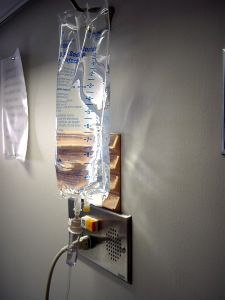
In 2011, a man, Michael Barbour then age 38, presented at Piedmont Newton Hospital Emergency Room complaining of chest pains. As part of the stress test he was undergoing, a catheter was inserted into his left arm and he was injected with a benign radioisotope to view his heart for heart disease.
During the examination, some of the solution from the IV was pumped into the soft tissue of Mr. Barbour’s arm whereby he suffered nerve and tissue damage that led to the development of regional pain syndrome which is a condition that causes chronic and intense pain. Mr. Barbour and his wife subsequently filed suit against Piedmont Newnan Hospital, Inc. and a nurse, Cherie Smith, alleging medical malpractice. The Barbour’s were awarded $ 4.4 Million in damages by a Fulton County Jury.
In medical malpractice cases, as I have stated in my website the Plaintiff must prove by a preponderance of the evidence that the doctor, hospital, physician, nurse, or the like deviated from the standard of care and were, therefore, negligent, that the Plaintiff was damaged, and that the negligence caused the damage to the Plaintiff. The Official Code of Georgia Annotated (O.C.G.A.) Section 51-1-27 defines when Recovery for Medical Malpractice is Authorized.
What makes this case different from a typical medical malpractice case is that it was against an Emergency Room. In medical malpractice cases against Emergency Medical Care, the Plaintiff’s burden of proof is not merely just negligence but rises to the level of having to prove gross negligence as set forth in O.C.G.A. Section 51-1-29.5(c). Said code section states in pertinent part that when an action involves a claim arising from emergency medical care in a hospital emergency department, obstetrical unit or in a surgical suite immediately following the evaluation or treatment of a patient in said hospital emergency department, no physician or health care provider shall be held liable unless it is proven by clear and convincing evidence that the physician or health care provider’s actions showed gross negligence.
The difference between negligence and gross negligence is defined by O.C.G.A. Section 51-1-4 that states, “In general, slight diligence is that degree of care which every man of common sense, however inattentive he may be, exercises under the same or similar circumstances. As applied to the preservation of property, the term “slight diligence” means that care which every man of common sense, however inattentive he may be, takes of his own property. The absence of such care is termed gross negligence.”
The distinction between the Plaintiff having to show gross negligence and not just negligence is a very important distinction in medical malpractice cases that involve Emergency Rooms as it raises the burden of proof for the Plaintiff to a much higher standard that is more difficult to prove.
The standard of care for the administration of an injection, as stated in the Allen v. Family Med. Ctr., P.C., 287 Ga. App. 522, Court of Appeals of Georgia, September 12, 2007, case, requires that prior to administering the injection that the most appropriate location to make the injection must be decided, then the type of medication to be administered must be decided, the size of the needle must be decided, and the location must be decided with precision, and not just “eye balled”. In the Barbour case, the Plaintiff showed that the standard of care was breached and not just by negligence, but by gross negligence causing severe injuries.
If you or a loved one have been injured in an Emergency Room, Emergency Care Facility or the like, then we are experts in these types of cases so please contact us immediately for your free legal consultation at 770-865-8654, (813) 363-6664, by email at juliericelaw@outlook.com, by the Contact Form on this Blog, and/or on our Website. We are here to assist you, and we encourage you to contact us as soon as something like this happens, or has happened, to you or a loved one since the time limitation on these types of cases is very short. We look forward to hearing from you soon.